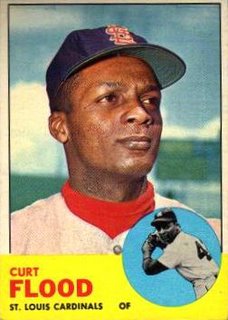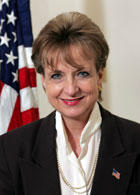
John Marshall is today remembered as the man who most forcefully gave life to the role of the Supreme Court as the final arbiter of constitutional authority in the early American republic. Despite a tide of political opposition to the notion of a strong federal government -- much of it coming from fellow Virginians such as his third cousin once removed,
Thomas Jefferson -- Marshall was the eloquent leader of the judicial estate, using the Court as a platform from which to draw a bright line between federal power and the uneasy idiosyncrasies of state parochialism.
John Marshall was born on this day in 1755 near Germantown, Virginia. As an officer in
George Washington's undersupplied Continental Army, Marshall survived the brutal winter at Valley Forge, an experience which some credit as one great source for his impatience with weak central sovereignty. After the War, he practiced law at Richmond, ironically arguing for the side of states' rights in his only case before the Supreme Court. In public life, however, he demonstrated his fierce commitment to federalism at every turn, as a leading member of Virginia's constitutional ratification convention and state legislator.
He turned down offers to become U.S. attorney general, minister to France and associate Supreme Court justice, but did at John Adams' behest serve alongside Charles Cotesworth Pinckney and Elbridge Gerry as part of the macho American delegation to France following the "XYZ Affair." Afterward, Adams made Marshall his secretary of state before appointing him as the nation's third chief justice in 1801.
His first dramatic statement on behalf of the Court was in
Marbury v. Madison (1803), in which he took the unprecedented step of declaring void a portion of an act of Congress (specifically, section 13 of the Judiciary Act of 1789) because it was, in the opinion of the Court, prohibited by the Constitution. Although Marshall did not say that the Court had the final word on what was constitutional, the decision did manage to breathe life into the Court's power of judicial review, as Marshall scolded Jefferson on the rule of law and positioned the Court as the protector of the principle.
He continued to establish and refine the Court's role in cases such as
McCulloch v. Maryland (1819, there upholding a federal statute) and
Cohens v. Virginia (1821, affirming the Court's authority to review state court decisions), emphasizing the Federalist principle that the people had, by their adoption of the Constitution, entrusted to the federal government, not to the states, the powers necessary to promote the survival of the nation.
Sometimes his decisions were not enforced by rebellious state courts or officials, and sometimes states'-rights Presidents Jefferson or
Jackson fueled the defiance; Jefferson, in particular, could get the man's goat from time to time, causing Marshall to react impetuously along political lines during the anti-Federalists' attempted impeachment of associate justice Samuel Chase in 1805 (Jefferson's unsuccessful counterattack on the Federalism of Marshall's court) and during the
Aaron Burr treason trial in 1807 (in which Marshall acquitted the thorn in Jefferson's side based on a strict interpretation of the law on treason). Sometimes you put the wrong two people together in an enclosed space (say, a room, or a government), and they just can't help but get on each other's nerves.
Even by the time Marshall's personal power began to decline on the Court in the mid-1820s, however, Marshall had nonetheless defined the leadership portfolio of the chief justice in American life for all of his successors to the office. Marshall died on July 6, 1835 in Philadelphia.
Categories: Juris-History, Marbury-v-MadisonLabels: Juris History, Legal History, SCOTUS




